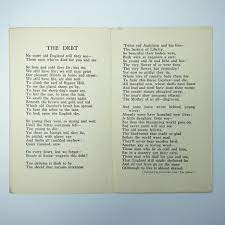Edward
was educated at The Friends’ School in Saffron Walden. After leaving school
Edward worked in a bookshop in Brighton before becoming a journalist for a
Brighton newspaper. He then went to
London to work on an evening paper.
In 1897,
Edward married Florence Elizabeth Griffin, whose father was American, and the
couple had a daughter, Audrey.
In
1904, Edward began working for “Punch” magazine and became assistant
editor. He worked there for 34 years and
in 1924 he also became Chairman of the publishers Methuen.
Edward
became a close friend of J.M. Barrie and joined Barrie’s recreational cricket
team. Barrie’s cricket team played their
final match on 28th July 1913 against E.V. Lucas’s XI at Downe House
School, which was at that time housed in Kent in a property that had belonged
to Charles Darwin. E.V.’s daughter Audrey Lucas, was a pupil at Downe House
School at that time.
During
the First World War, E.V. Lucas worked as a Secretary for the British Red Cross
in Italy. His WW1 poetry collections
were: “The Debt” (Methuen, 1914; “Guillaumism:
two aspects (Clement Shorter, 1914); “Swollen-headed William: painful stories
and funny pictures after the German” (Methuen, 1914); and his poems were
published in four WW1 poetry anthologies.
Edward and his wife Elizabeth set up and ran a home for French children orphaned by the war with financial aid from J.M. Barrie in a chateau in France. "Bettancourt" was on the River Marne and in the war zone and was a refuge for children orphaned or displaced by the War. Their daughter Audrey, who was also a poet, helped out during the school holidays.
https://femalewarpoets.blogspot.com/2013/10/todays-ww1-female-poet-audrey-lucas.html
Soon
after the end of the war Edward and Elizabeth separated and Edward died in a
nursing home in Marylebone, London at the age of seventy.
This is my favourite poem by E.V. Lucas - I read it when I was in primary school, where we were encouraged to read poems and to have a go at writing poems ourselves.
"The Windmill"
If you should bid me make a choice
'Twixt wind- and water-mill,
In spite of all the mill-pond's charms
I'd take those gleaming, sweeping arms
High on a windy hill.
The miller stands before his door
And whistles for a breeze;
And, when it comes, his sails go round
With such a mighty rushing sound
You think of heavy seas.
And if the wind declines to blow
The miller takes a nap
(Although he'd better spend an hour
In brushing at the dust and flour
That line his coat and cap).
Now, if a water-mill were his,
Such rest he'd never know,
For round and round his crashing wheel,
His dashing, splashing, plashing wheel,
Unceasingly would go.
So, if you'd bid me take a choice
'Twixt wind- and water-mill,
In spite of all a mill-pond's charms,
I'd take those gleaming, sweeping arms
High on a windy hill.
Sources:
Catherin
W. Reilly “English Poetry of the First World War: A Bibliography“, (St. Martin’s Press, New
York, 1978), p. 204.Audrey Lucas “E.V. Lucas A Portrait”
Find my Past: Register of British Red Cross WW1 Overseas Volunteers
https://search.findmypast.co.uk/record?id=gbm%2fredcro%2f5647
and
https://www.revolvy.com/main/index.php?s=E.%20V.%20Lucas
Photograph of E.V. Lucas in 1895.


